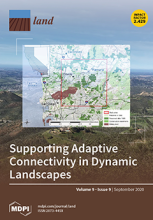Land Library
Welcome to the Land Portal Library. Explore our vast collection of open-access resources (over 74,000) including reports, journal articles, research papers, peer-reviewed publications, legal documents, videos and much more.
/ library resources
Showing items 1 through 9 of 33.The rise of urban populations has rendered cities in both developed and developing countries vulnerable to poor health and diseases that are associated with urban living conditions and environments.
Informal settlements represent a challenging operational context for local government service providers due to precarious contextual conditions.
In an era of global warming, long-standing challenges for rural populations, including land inequality, poverty and food insecurity, risk being exacerbated by the effects of climate change.
The 2019 fire crisis in Amazonia dominated global news and triggered fundamental questions about the possible causes behind it. Here we performed an in-depth investigation of the drivers of active fire anomalies in the Brazilian Amazon biome.
Existing studies on blockchain within land administration have focused mainly on replacing or complementing the technology for land registration and titling.
Due to industrial civilization, the decline of the countryside has become a global phenomenon. Spain is a good example that reflects this issue in the rural areas of the European Union because more than half of all municipalities in the country are at risk of extinction.
To investigate the rural labor transfer effects of China’s Collective Forestland Tenure Reform (CFTR), we employ binary probit models by using survey data of 694 households from China’s northern collective forest areas.
This case study from Stockholm County, Sweden, explores practitioners’ experiences of barriers and bridges in municipal planning practices to support actions for ecosystem services.
A discussion of the assumptions that underlie efforts to register land enables us to not only evaluate their validity across different contexts, but most importantly, to further understand how the low incidences of land registration might derive from very fundamental sources outside of difference



